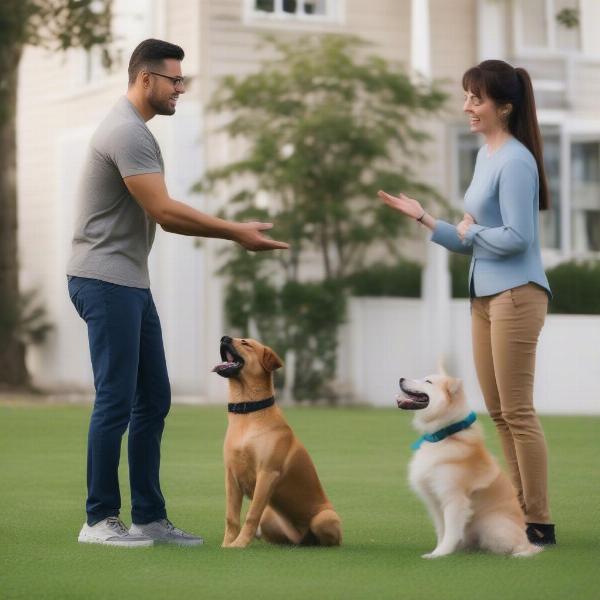Mace and other pepper sprays are often considered as self-defense tools, but their effectiveness and ethical implications when used on dogs raise serious concerns. Understanding the potential dangers and exploring alternative, humane approaches to dog encounters is crucial for responsible pet ownership and community safety. Does mace actually deter a dog, and at what cost? Let’s delve into this complex issue.
Understanding Mace and its Effects on Dogs
Mace, a brand name for a type of pepper spray, contains inflammatory agents, primarily oleoresin capsicum (OC), derived from chili peppers. When sprayed, it causes intense burning sensations in the eyes, nose, and throat. While designed for human aggressors, some consider using it on aggressive dogs. However, using mace on a dog can be dangerous and inhumane. The intense pain and disorientation can cause unpredictable reactions, potentially escalating the situation rather than diffusing it.
The Dangers of Using Mace on Dogs
While mace might temporarily deter a dog, it doesn’t address the underlying cause of the aggression. The pain inflicted can cause long-term psychological trauma and even physical harm. Breathing difficulties, temporary blindness, and skin irritation are potential side effects. In some cases, especially with smaller breeds or dogs with respiratory issues, mace can be fatal. Furthermore, the indiscriminate nature of spray can affect other animals or even bystanders. Instead of reaching for mace, it’s crucial to understand the reasons behind a dog’s aggressive behavior.
Alternatives to Mace for Dog Encounters
Instead of resorting to harmful deterrents like mace, several humane and effective alternatives exist. Maintaining a calm demeanor and avoiding direct eye contact can often de-escalate a tense situation. Slowly backing away while avoiding sudden movements can also prevent triggering further aggression. Carrying a dog whistle or using verbal commands can sometimes distract or deter an approaching dog.
Preventing Dog Aggression: A Proactive Approach
Addressing the root causes of dog aggression is vital for fostering a safe and harmonious environment for both dogs and humans. Proper socialization during puppyhood plays a critical role in developing appropriate social skills. Consistent training, using positive reinforcement methods, can help establish clear boundaries and desired behaviors. Providing adequate exercise and mental stimulation can also reduce the likelihood of aggression stemming from boredom or frustration.
Seeking Professional Help for Aggressive Dogs
If you encounter a consistently aggressive dog, it’s essential to report the incident to the appropriate authorities. Professional dog trainers or behaviorists can assess the dog’s behavior and develop a tailored training plan.  Dog Training Session Remember, responsible pet ownership involves prioritizing the well-being of both your dog and the community.
Dog Training Session Remember, responsible pet ownership involves prioritizing the well-being of both your dog and the community.
Conclusion
Using mace on a dog is rarely a justifiable solution. While it may offer a temporary fix, the potential for harm and the ethical implications far outweigh any perceived benefits. Prioritizing humane and effective alternatives, focusing on prevention, and seeking professional help when needed are crucial steps in creating a safe and positive environment for both dogs and people. Remember, understanding and addressing the root causes of aggression is the key to fostering harmonious relationships between humans and their canine companions.
FAQ
- Is mace legal to use on dogs? The legality varies depending on local regulations. However, even where legal, its use raises ethical concerns.
- What should I do if an aggressive dog approaches me? Remain calm, avoid eye contact, and slowly back away. Avoid sudden movements.
- How can I prevent my dog from becoming aggressive? Early socialization, consistent training, and providing adequate exercise are crucial.
- What are some humane alternatives to mace for deterring dogs? Dog whistles, verbal commands, and calm assertive behavior can be effective.
- Where can I find professional help for an aggressive dog? Consult a certified dog trainer or a veterinary behaviorist.
why-is-there-ethyl-lactate-in-flea-spray-for-dogs
sesame-oil-in-flea-spray-for-dogs
ILM Dog is your trusted resource for comprehensive information on dog care, breeds, health, training, and much more. We are dedicated to providing practical advice and valuable resources to help you navigate every aspect of dog ownership. Whether you’re a seasoned dog owner or just starting your journey, ILM Dog is here to support you. Contact us today for expert advice and personalized guidance! Email: [email protected] Phone: +44 20-3965-8624 We offer tailored solutions for your unique needs, focusing on breed selection, health management, behavioral training, nutritional guidance, grooming, and product recommendations.